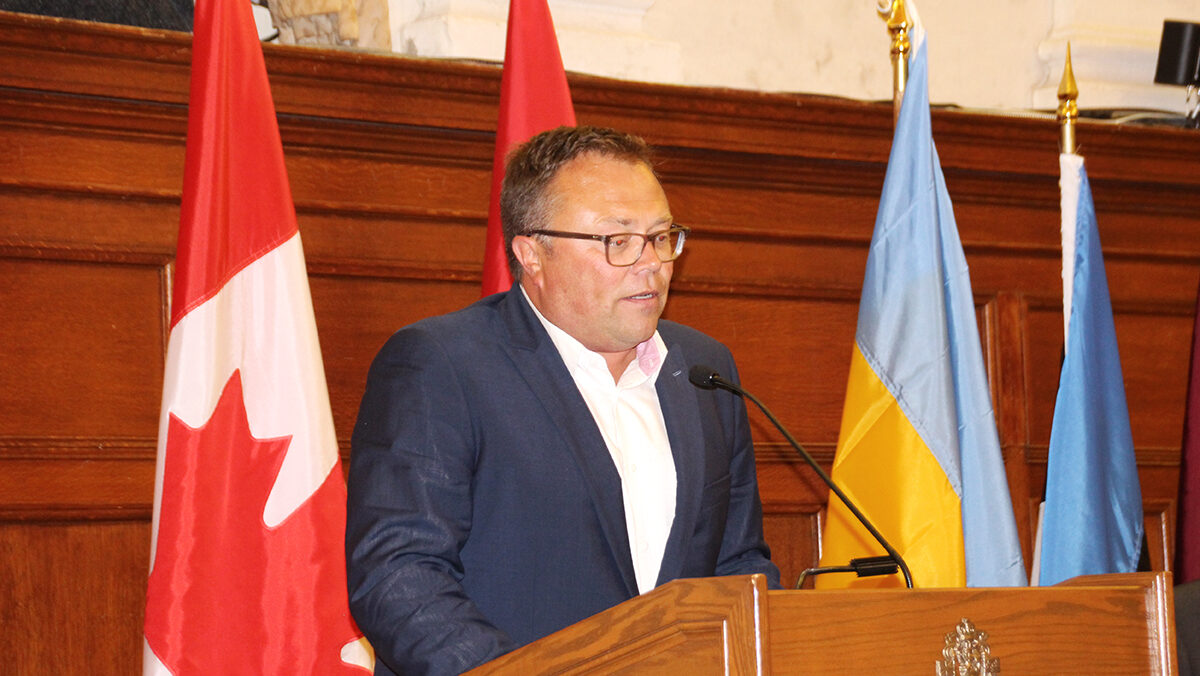This incident, a small piece in the mosaic of Russia’s hybrid warfare tactics — including GPS jamming, undersea sabotage, and relentless psychological and information warfare — set off alarms in Estonia — although they have made little news in the media. The nerves of this nation, and those of its Baltic neighbors, have been on edge since the full-scale invasion of Ukraine began in February 2022.
As the NATO summit, marking the alliance’s 75th anniversary, takes place this month in Washington, Russia’s brutal war on Ukraine is a stark reminder of its dark history of mass repression, forced relocations, and unspeakable terror, in a way that was not anticipated after the end of the Cold War. But it resonates deeply with the Baltic states.
For Estonia, Latvia, and Lithuania, the struggle to achieve, maintain, and reclaim their independence, cultures, and languages has been a centuries-long battle against Russia’s and the Soviet Union’s imperialism. But the mounting civilian casualties and war crimes in Ukraine echo the terror Moscow inflicted on the Baltics in the last century, reigniting historical traumas and fears of future atrocities.
The fight for Ukraine’s sovereignty is also intrinsically linked to the security and existence of the Baltic states. Today, the people of Estonia, Latvia, and Lithuania are steeling themselves for what might come next.
“…the invasion of Ukraine has shocked Western countries into the realization that to counter these threats, they must show unwavering determination to defend smaller NATO countries as well as providing Ukraine with every necessary tool to reclaim its sovereignty.”
Vladimir Putin’s territorial ambitions have proven boundless, and the recolonization of nations once subjugated by the Soviet Union and Tsarist Russia now appears a primary objective of his geopolitical strategy.
Although some in the West questioned the need to support NATO, the invasion of Ukraine has shocked Western countries into the realization that to counter these threats, they must show unwavering determination to defend smaller NATO countries as well as providing Ukraine with every necessary tool to reclaim its sovereignty.
As the war progresses, this unified resolve and the cohesion are precisely what Putin aims to fracture. Fragmented and isolated, many NATO members — including Canada — could become vulnerable to future aggression. No countries are as aware of this as its close neighbours, the Baltics.
In Putin’s own words, his goals are the consolidation of power, subjugation, and domination of former Soviet republics. Such aggression can only be deterred by a clear demonstration of unity, strength, and the imposition of severe consequences for his actions.
Manufacturing Conflict to Consolidate Power
Since his appointment as Prime Minister by Boris Yeltsin in 1999, Putin has not hesitated to manufacture conflicts to consolidate his power. He has perpetuated a narrative that Russia is besieged by enemies — a narrative that justifies his authoritarian grip on power. The Baltics were in his sights early in his presidency.
In 2007, a manufactured crisis in Estonia over the relocation of a Soviet war memorial, orchestrated by the Russian embassy, tested Western resolve.
Estonia resisted, but the following year, Russia invaded Georgia, and in 2014, it occupied Crimea and eastern Ukraine. Russia's unchecked aggressions continued in Syria and Africa, leaving a trail of destruction and human misery. Each time, the West’s tepid responses added fuel to Putin’s imperialist ambitions.
In terms of information warfare, influence operations, and hybrid tactics, Russia is already waging war against the Baltic States. Their rapid progress in embracing democracy after enduring 50 years of Soviet occupation and repression threatens Putin’s anti-democratic narratives.
Their success poses a direct challenge to Putin, who has been dragging Russia back to its corrupt, totalitarian past.
Putin’s legitimacy hinges on a façade: that Russia is surrounded by democratic foes intent on eroding its culture, language, and sovereignty — threats only he can thwart. Ukraine’s resistance and potential victory against Russian aggression threaten this narrative profoundly.
To sustain his facade, Putin has deployed an array of false narratives and conspiracies.
Neo-Imperialist and False Narratives
Chief among these is the preposterous claim that Ukraine and its Baltic allies are ruled by neo-Nazis. Ukraine’s president is Jewish, and not a single far-right party holds a seat in Ukraine’s parliament, unlike Austria, Germany, France, Italy, and many other European nations.
“Other narratives have included spurious stories about US biolabs in Ukraine, aggressively promoted by Russian and Chinese state media, and amplified by populist and illiberal influencers and Western conspiracy theorists like Alex Jones, RFK Jr, and Tucker Carlson.”
This narrative is cynically deployed by Putin to falsely justify Russia’s invasion and to incite hatred towards Ukrainians, as well as other minorities or critics targeted in this ongoing Russian disinformation campaign. This narrative has also been used to dehumanize and discredit Estonians, Latvians, and Lithuanians.
Other narratives have included spurious stories about US biolabs in Ukraine, aggressively promoted by Russian and Chinese state media, and amplified by populist and illiberal influencers and Western conspiracy theorists like Alex Jones, RFK Jr, and Tucker Carlson. The legitimacy of Ukraine’s government has also been subject to Kremlin conspiracy theories suggesting that the 2014 Maidan Revolution was a coup backed by the West.
For the Baltic countries it is nothing new. Estonia, Latvia, and Lithuania have been significant targets of Russian disinformation campaigns for nearly two decades. Similar to Ukraine, Russian propagandists regularly question these nations' right to exist independently and the legitimacy of their NATO membership. Russia spares no effort in persuading Western audiences of the legitimacy of its attempts to reclaim its former empire.
Sabotage & Hybrid Warfare
European intelligence agencies have issued stark warnings of Russia's plans for sabotage, bombings, and arson attacks across Europe and potentially beyond. They caution that these actions could soon escalate to include environmental catastrophes.
In addition to jamming commercial aircraft GPS signals in the Baltic region, Russia is suspected of being responsible for a massive fire at a Warsaw mall in May. Swedish authorities suspect that state-backed saboteurs are behind train derailments in the country's north, while Russian agents are alleged to have been responsible for a fire at an IKEA warehouse near Vilnius, Lithuania, and a failed arson attack in Prague in early June.
Meanwhile, Russia's deployment of a decrepit and ill-constructed “shadow fleet” of oil tankers to circumvent sanctions poses grave environmental and security risks. These vessels, frequently uninsured and inadequately maintained, engage in perilous ship-to-ship oil transfers in the Baltic Sea, threatening an imminent ecological disaster.
Furthermore, the sophisticated communications equipment aboard this fleet hints at potential espionage activities, heightening security concerns among Baltic Sea nations.
The Impact and Trauma of Russian Aggression in the Baltic Nations
The historical traumas of Estonians, Latvians, and Lithuanians, rooted in their experiences as victims of Russian colonialism and terror, are being provoked by the horrific images of atrocities committed by Russian soldiers in Ukraine and incidents like those that took place in Bucha.
As Russian armies flatten Ukrainian towns and villages, kidnapping children and committing unspeakable acts against civilians, the images and stories have a deep impact on indigenous Baltic societies. Even though they pose no real threat to Russia and have no interest in doing so, they find themselves gripped by a very real and existential fear. This fear is not just a relic of history but a reaction to the brutal realities unfolding before their eyes.
During my recent visits to the region, friends confided that the threat of Russian aggression weighs heavily on them and permeates everyday life. Concerns about foreign investment are mounting, and the real estate market is softening. The Baltic governments’ extraordinarily high per capita support for Ukraine is straining other budgets, creating domestic political tensions — to the Kremlin’s benefit.
For the Baltic States, supporting Ukraine is not merely an act of solidarity; it is a strategic imperative to stop Russian aggression and terror from metastasizing to Estonia, Latvia, Lithuania, and beyond. They understand that achieving long-term peace and stability in Europe requires suppression of Putin’s ambitions by helping Ukraine reclaim the territories currently occupied by the Russian army.
Credible Deterrence Over Re-Conquest & Re-Colonization
Credible defensive deterrence is critically important to achieving this goal. NATO has already committed to bolstering its collective presence in the Baltic States. They are pressing for preventative action as the Ukraine war grinds on, with NATO maintaining a continuous rotational presence of forces and investing in advanced technologies such as jointly procured air, ground, and naval missile defense systems to protect NATO’s eastern flank.
Although the Ukraine war has held much of the world’s attention, the Baltic countries on the fringes of Russia understand that the threat is real – as Sweden and Finland did in renouncing their neutral status and joining the NATO alliance.
This not only contributes to deterrence but also provides much-needed relief from Russia’s psychological warfare. It bolsters their national morale and demonstrates to potential aggressors that any attack on these countries will provoke a unified and robust response.
“Our reluctance to fully support nations under direct attack and our reliance on half-measures have emboldened Putin to increase his aggressive actions.”
Conversely, the West’s hesitation or any perceived weakness nourishes Putin’s confidence, feeding his neo-Tsarist ambitions and inviting further aggression, particularly toward its near neighbours. History has shown that failing to confront Putin’s aggression only leads to further escalation.
The West's inadequate response to Russia's annexation of Crimea and the war in eastern Ukraine have not deterred Putin; this has encouraged him. Our reluctance to fully support nations under direct attack and our reliance on half-measures have emboldened Putin to increase his aggressive actions.
As the NATO countries gather in Washington to plan their next steps in the struggle against Putin’s aggression, it is important to understand that the struggle is not merely their own. It is a defense of our collective democratic values and freedom, as the frontline countries well understand, and none more so than those who have experienced the repression that Russia has imposed.
Russian narratives aimed at undermining NATO's unity often cast doubt on the legitimacy of the Alliance’s Baltic members. A prominent example is the Kremlin's myth that NATO promised to reject any new members from Central and Eastern Europe after the Cold War, a claim with no supporting evidence.
Article 10 of NATO’s founding treaty enshrines an open-door membership policy for nations wishing to join the alliance; there is no expansion policy, nor does the organization actively seek new members. Former Russian President Mikhail Gorbachev, in a 2014 interview with a Russian state-controlled media outlet, stated:
“The topic of ‘NATO expansion' was not discussed at all, and it wasn't brought up in those years. I say this with full responsibility. Not a single Eastern European country raised the issue, not even after the Warsaw Pact ceased to exist in 1991. Western leaders didn't bring it up either.”
Any suggestions by the Kremlin that NATO has been actively seeking new members as part of an “expansion” strategy aimed at encircling Russia are entirely unfounded. This perspective denies smaller nations like Estonia, Latvia, and Lithuania their agency and dismisses their right to determine their own security arrangements and futures. It implicitly grants Russia a neo-colonial control over its neighbouring nations, thus encouraging the aggression and atrocities we've witnessed in Ukraine.
Where Russia’s information war against Estonia, Latvia, and Lithuania aims to undermine public opinion within NATO nations, Russia’s hybrid war targeting the region is provoking fear and stress within these countries.
This article was originally published in Peace Magazine’s June issue and was reprinted with the permission of the author.




